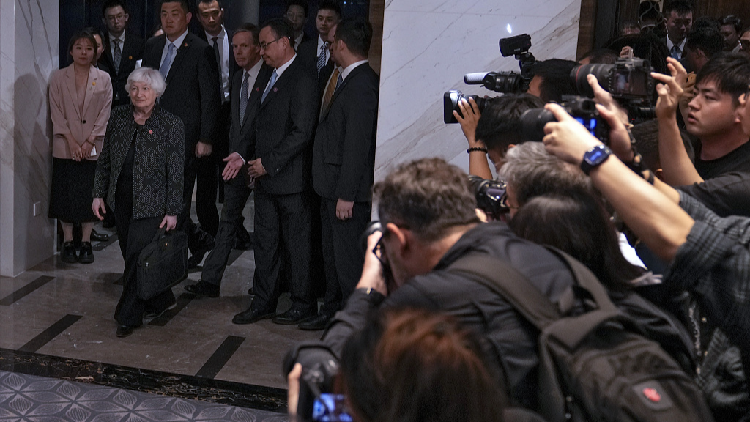- cross-posted to:
- worldnews@lemmygrad.ml
- worldnews@lemmy.ml
- cross-posted to:
- worldnews@lemmygrad.ml
- worldnews@lemmy.ml
Editor's note: Radhika Desai, a special commentator on current affairs for CGTN, is a professor of political studies at the University of Manitoba in Canada. The article reflects the author's opinions and not necessarily the views of CGTN.
U.S. Treasury Secretary Janet Yellen was recently in China to talk about its "clean energy overcapacity." What can that possibly mean? At a time when the world needs more and cheaper clean energy equipment to deal with climate change, isn't China helping the world by making this equipment more widely available at prices more of the world can afford? Surely, that is just what the world needs in 2024.
After all, 2023 broke so many climate records. It was the warmest year on record. There were record-breaking forest fires and floods. It was the hottest northern hemisphere summer. July 2023 was the hottest month on record. Considering these facts, one might think everyone would welcome China's plentiful and cheap clean energy equipment.
Evidently, not. The U.S. Treasury Secretary Janet Yellen accused China of flooding the world with cheap clean energy exports, distorting global markets and harming workers. What explains this perversity?
The crux of the problem is the U.S.'s stance on climate change. It would be understandable if it supported solutions that were beneficial to it and its people. However, not only does the U.S. seek benefits not for its people but its corporations, it seeks solutions that not only benefit them but also put them in a dominant position.
Yellen kicked off her campaign against Chinese overcapacity at a solar energy plant in Georgia just days before she set foot in Beijing. She alleged that China had previously inflicted overcapacity in steel and aluminium and was now doing this in the clean energy sector, particular in solar panels, lithium-ion batteries and electric vehicles. "China's overcapacity distorts global prices and production patterns and hurts American firms and workers," she stated.
Capacity can only be excessive in relation to demand. When the problem is labelled overcapacity the 'solution' is to cut (other nations') capacity. One could always see it as a problem of restricted demand, to be solved by expanding it. U.S. elites have long approached the crisis of the 1970s as one of over-capacity and sought to deal with the problem by restricting or even reducing industrial capacity in its rivals. It did this to Japan starting in the 1990s. It is currently doing this to Europe, forcing it to deindustrialize, allegedly in order to fight the hyped-up danger that Russia poses. And now, Yellen has brought this effort to China.
If China's industrial capacity is deemed excessive, it must be restricted so that, when such equipment becomes scarce, U.S. products of lesser quality and higher cost will find markets. It also amounts to saying that the U.S. absolutely does not wish to increase the rest of the world's capacity to demand more by increasing development and therefore demand there.
In speaking of China distorting markets, Yellen is saying that China captures markets through subsidies. This is, of course, particularly rich when the U.S. offers billions in industrial subsidies and talks of reviving industrial policy. Moreover, it denies the simple fact that no country has industrialized without protecting itself, and using myriad forms of state direction, including subsidies. This understanding defined the terms on which China entered the World Trade Organization in 2000. The U.S. was willing to grant these terms only because it assumed that China would be no more successful than other developing countries in using such provisions to industrialize and become a technological leader. It was wrong.
Finally, Yellen speaks of China harming U.S. workers. The sad, even macabre, reality is that U.S. workers have been harmed over all these neoliberal decades not by China but by the pro-corporate and pro-financialization neoliberal U.S. policies. They have deindustrialized the U.S., stagnated working class wages and, by shifting income and wealth from the ordinary people towards a tiny elite, generating vast inequality.
Sadly, for Yellen, China is neither Japan nor Europe but a socialist economy whose government is oriented towards advancing egalitarian development for its people. Yellen will find it willing to cooperate for the benefit of people and the planet. But it will not roll over and play dead when asked to harm its own economy, its own workers and the possibility of dealing with climate change, all only so that the interests of unproductive inefficient and financialized U.S. corporations may be advanced.
Free download of her latest book: Capitalism, Coronavirus and War: A Geopolitical Economy
Capitalism, Coronavirus and War investigates the decay of neoliberal financialised capitalism as revealed in the crisis the novel coronavirus triggered but did not cause, a crisis that has been deepened by the conflict over Ukraine and its repercussions across the globe.
Leading domestically to economic and political breakdown, the pandemic accelerated the decline of the US-led capitalist world’s imperial power, intensifying the tendency to lash out with aggression and militarism, as seen in the US-led West’s New Cold War against China and the proxy war against Russia over Ukraine. The geopolitical economy of the decay and crisis of this form of capitalism suggests that the struggle with socialism that has long shaped the fate of capitalism has reached a tipping point. The author argues that mainstream and even many progressive forces take capitalism’s longevity for granted, misunderstand its historical dynamics and deny its formative bond with imperialism. Only a theoretically and historically accurate account of capitalism’s dynamics and historical trajectory, which this book provides, can explain its current failures and predicament. It also reveals why, though the pandemic—by revealing capitalism’s obscene inequality and shocking debility—prompted the most serious critiques of capitalism to emerge in decades, hopes of ‘building back better’ were so quickly dashed. This book sheds searching light on the dominant narratives that have normalised the neoliberal financialised capitalism and the dollar creditocracy dominating the world economy, with even critics unable to link capitalism’s neoliberal turn to its financialisations, historical decay, productive debility and international decline. It contends that only by appreciating the seriousness of the crisis and rectifying our understanding of capitalism can progressive forces thwart a future of chaos and/or authoritarianism and begin the long task of building socialism.
This book will be of great interest to students, scholars and researchers of international relations, international political economy, comparative politics and global political sociology.




